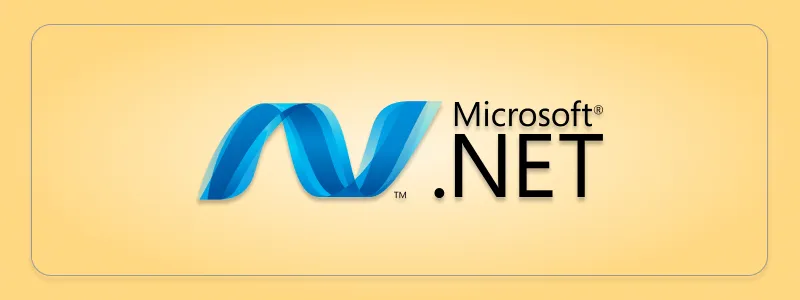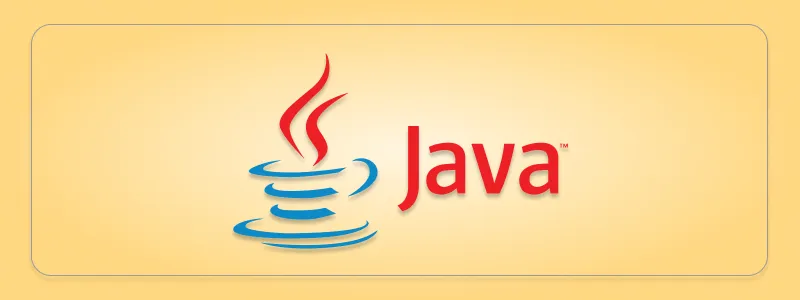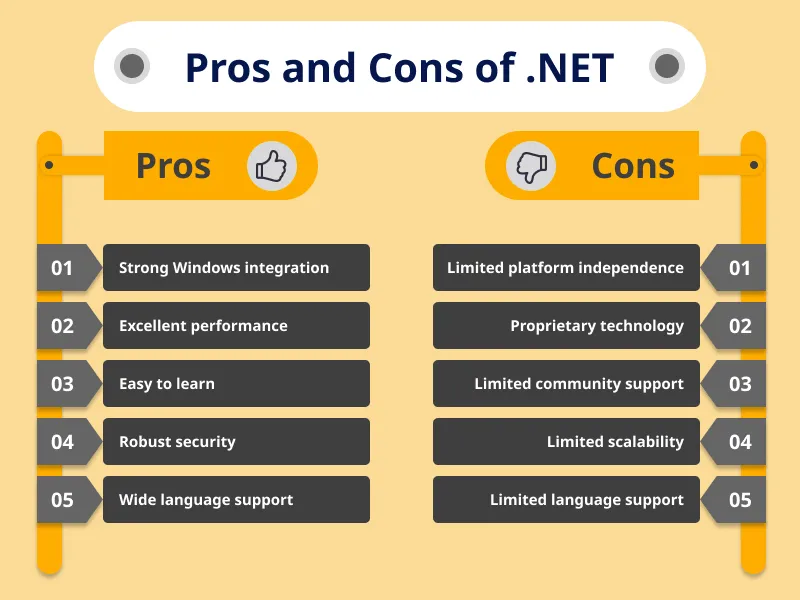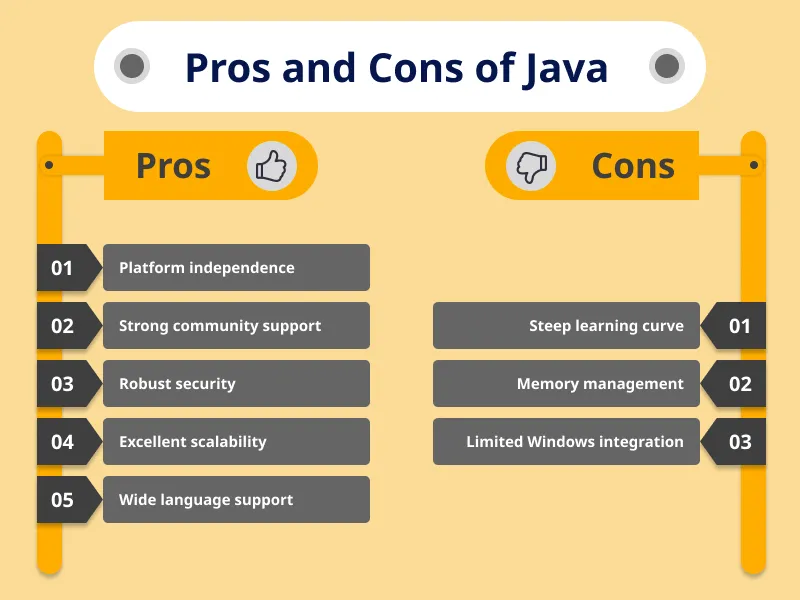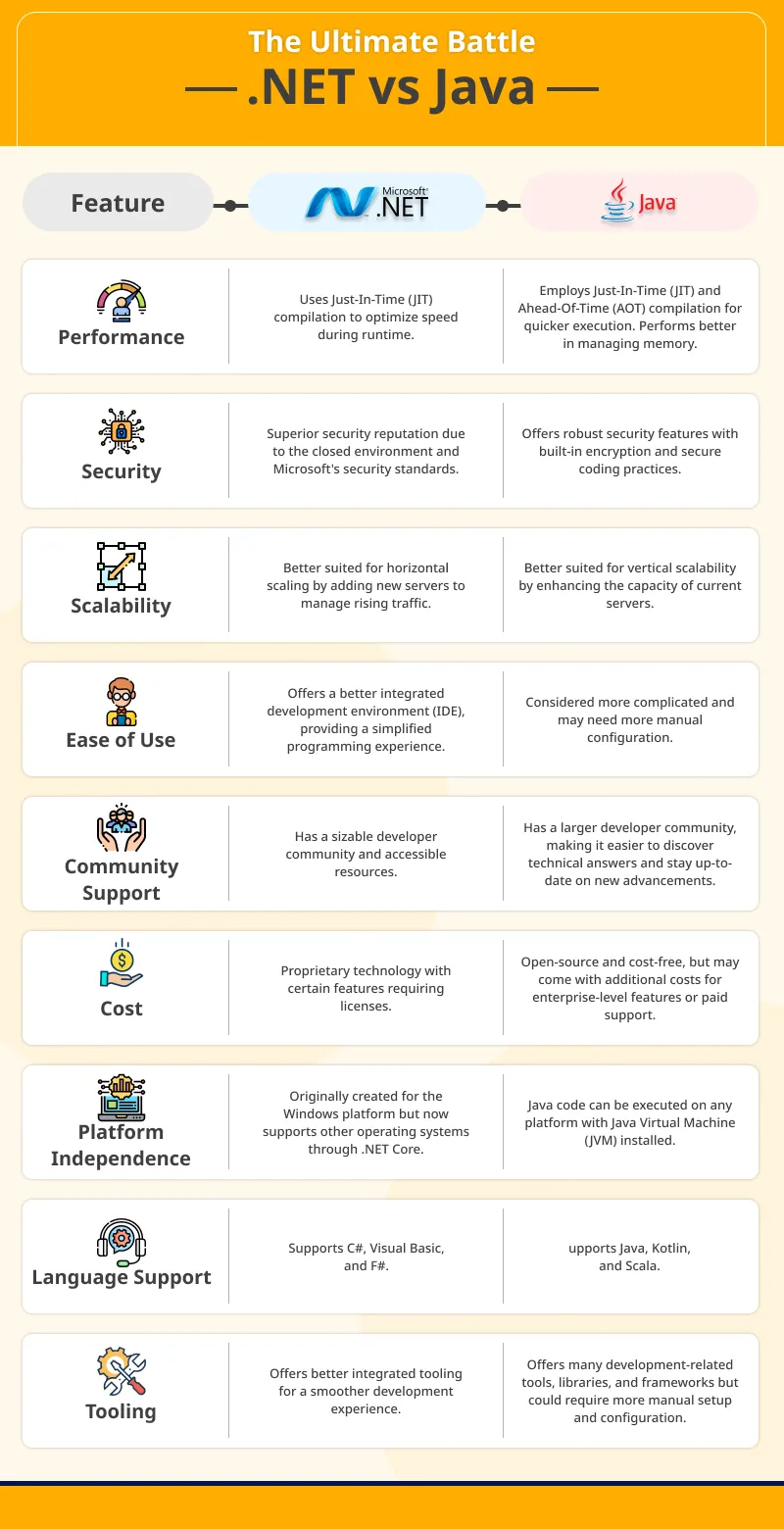Java and .NET are two widely used development technologies for web applications. However, when comparing websites using server-side programming languages, as per W3techs.com, ASP.NET is used by 7.1% of websites, whereas Java is used by 4.7%.
As businesses seek to modernize their web applications, the choice of technology stack becomes critical. This blog will compare .NET vs Java in the ultimate battle of web application assemblies.
At ValueCoders, our team of experts has extensive experience in developing web applications using both .NET and Java. Join us as we dive into the technical details of .NET and Java, and compare them.
.NET vs Java: An Overview
.NET
Microsoft created the free, open-source .NET framework, which is cross-platform. For Windows, Linux, and macOS, it enables programmers to create cutting-edge, high-performing programs. A runtime, a framework, a class library, and a collection of tools comprise the .NET framework, which offers a wide range of functionality for creating online applications. When you hire ASP.NET developers, they may build web apps using C#, F#, and Visual Basic.
Also read: 10+ .Net Core Libraries
Java
Java is a popular platform for developing web applications because of its reputation for reliability, security, and portability. It is a well-known programming language created in 1995 by Sun Microsystems, which Oracle now owns.
It is an object-oriented language with platform independence. The programs written on Java may run on any hardware or operating system with a Java Virtual Machine (JVM) set up.
In addition to its core language, Java has a rich ecosystem of tools and frameworks; therefore, when you hire Java app developers, they can easily build web applications. Popular frameworks like Spring, Hibernate, and Struts are among them.
Java also boasts a sizable and vibrant developer community, so individuals needing assistance or those interested in learning more about the language may find a wealth of resources online.
Get free consultation and let us know your project idea to turn it into an amazing digital product.
Pros and Cons of .NET
Pros:
- Strong Windows integration: .NET was originally developed for the Windows platform and provided tight integration with the operating system.
- Excellent performance: .NET’s Just-In-Time (JIT) compilation optimizes performance at runtime, making it faster than Java for executing complex algorithms.
- Easy to learn: .NET has a more integrated development environment (IDE) that provides a better-streamlined development experience.
- Robust security: .NET’s security protocols are known for their robustness and make a significant reason many businesses choose .NET for their projects.
- Wide language support: .NET supports various programming languages, including C#, Visual Basic, and F#.
Cons:
- Limited platform independence: While .NET has expanded to support other operating systems through .NET Core, it is still primarily a Windows technology.
- Proprietary technology: Some features of .NET require licenses, which can add to the overall cost of a project.
- Limited community support: While .NET has a large and growing community, it is not as established as Java’s community.
- Limited scalability: While .NET can handle large traffic volumes, it is less scalable than Java for vertical scaling.
- Limited language support: While .NET supports multiple languages, its support is more limited than Java.
Also Read: Building a Dream Team: How to Hire Top iOS, Android, and Web Developers
Pros and Cons of Java
Pros:
- Platform independence: Java code can run on any platform with the Java Virtual Machine (JVM) installed, making it highly portable.
- Strong community support: Java has a large and active developer community, with a wide variety of libraries, frameworks, and resources available for development.
- Robust security: Java’s security features, such as built-in encryption and secure coding practices, are well-established and widely respected.
- Excellent scalability: Java is highly scalable and can handle large volumes of traffic and data.
- Wide language support: Java supports various programming languages, including Java, Kotlin, and Scala.
Cons:
- Steep learning curve: Java has a reputation for being more complex and requiring more manual configuration, which can make it more difficult for beginners to learn.
- Memory management: Java’s garbage collection can cause performance issues if not appropriately optimized.
- Limited Windows integration: While Java can run on the Windows platform, it is not as tightly integrated with the platform as .NET.
Get free consultation and let us know your project idea to turn it into an amazing digital product.
The Ultimate Battle: .NET vs Java
Java and .NET are the most popular programming languages for creating online applications. While they have many things in common, they also differ significantly from one another, which may make one technology stack better suited for a given project than the other.
Let’s compare .NET vs Java:
-
Performance:
Both Java and .NET are high-performance programming languages. When running sophisticated algorithms, .NET is often quicker than Java, although Java performs better when managing memory. While Java employs Just-In-Time (JIT) compilation and Ahead-Of-Time (AOT) compilation for even quicker execution, .NET uses Just-In-Time (JIT) compilation to optimize speed during runtime.
Also Read: 10+ .Net Core Libraries- Introducing To The New Wave Of Web Development
-
Security:
Both .NET vs Java offers robust security features like built-in encryption and secure coding practices. However, because it is a closed environment and depends on Microsoft’s security standards, which are renowned for their robustness, .NET has a superior security reputation.
-
Scalability:
Both .NET and Java are incredibly scalable platforms that manage enormous traffic and data quantities. However, Java is better suited for vertical scalability, while .NET is better suited for horizontal scaling. This implies that a Java app development company can help you enhance the capacity of current servers, whereas .NET is better at adding new servers to a system to manage rising traffic.
-
Ease of use:
A wide range of tools, libraries, and frameworks are available in .NET and Java that simplify development. However, .NET features a better-integrated development environment (IDE), offering a simplified programming experience. On the other hand, Java has a reputation for being more complicated and needing more manual configuration.
-
Community Support
The developer communities for both .NET vs Java are sizable and vibrant, offering help, exchanging best practices, and participating in open-source initiatives. It is simpler to discover technical answers and remain current on new advancements in the industry using Java because it has been around for a long time and has a larger developer community and accessible resources.
Also read: Java 10: New Features And Enhancements
-
Cost
Both Java and .NET have benefits and drawbacks when it comes to price. Certain features, such as sophisticated security systems, require licenses. On the other hand, Java is open-source and cost-free, although it could come with extra costs for enterprise-level features or paid support. A proprietary technology created by Microsoft is called .NET.
-
Platform Independence
Java is renowned for its “write once, run anywhere” principle, which states that Java code may be executed on any platform that has the Java Virtual Machine (JVM) installed. .NET, on the other hand, was first created for the Windows platform but has now evolved to support other operating systems through .NET Core.
-
Language Support
.NET vs Java both support a wide range of programming languages. While Java offers Java, Kotlin, and Scala, .NET supports C#, Visual Basic, and F#. Java’s support is more language-specific, whereas .NET’s support for several languages is more integrated, with a shared runtime and libraries.
-
Tooling
Both .NET and Java offer many development-related tools, libraries, and frameworks. However, the tooling for .NET is better integrated and offers a smoother development experience. Despite being more comprehensive, Java’s tools could need more manual setup and configuration.
Therefore, while .NET vs Java share many similarities, they also differ. When choosing between the two, it’s essential to consider the specific needs of your project and which technology stack aligns best with those needs.
Overall, both Java and .NET have their pros and cons. When deciding which technology stack to use for a project, it’s essential to consider its specific needs and which technology stack aligns best.
Get free consultation and let us know your project idea to turn it into an amazing digital product.
Choosing the Right Technology Stack for Your Web Application
Choosing the appropriate technology stack for your web application may significantly impact the project’s success. There are several things to consider while picking between .NET vs Java, including:
- Project requirements: The first step is to identify the specific requirements of your project. Consider the application’s complexity, scalability requirements, system integration, and device compatibility.
- Team expertise: Consider the skills and experience of your development team. If your team has expertise in .NET, it may be the best choice for your project. Similarly, if your team is experienced in Java, it may be more suitable for your project.
- Community support: Both .NET vs Java have large and active communities that provide extensive support and resources. Consider the availability of third-party libraries, frameworks, and tools and the frequency of updates and new releases.
- Cost: Cost is critical in choosing the right technology stack for your project. Consider each technology’s licensing costs, hardware requirements, and development costs.
- Compatibility: Ensure that your chosen technology stack is compatible with your existing systems and infrastructure. This includes operating systems, databases, and other third-party tools.
The decision on .NET vs Java ultimately comes down to your project’s unique requirements and the level of experience of your development team. Before making a choice, thoroughly weigh all the options, and get advice from a seasoned development partner to ensure your web application is created to the highest standards.
Also Read: From Idea to Launch: The Ultimate Guide to App Development
Choose ValueCoders
ValueCoders is a leading software development company offering .NET vs Java technologies expertise. We provide end-to-end development services and can assist you in selecting the best technology stack for your project from our team of skilled professionals.
We have a proven track record of providing clients in various sectors with high-quality solutions, including e-commerce, healthcare, and finance. Due to the breadth of knowledge, our development team has in both .NET and Java development services, we can create unique solutions suited to your company’s requirements.
You can also see our case studies where we have used Java and NET for our clients. Some of them are:
- Performance Management Tool for Startups (JAVA)
- Electronic Health Record System (.NET)
- Developing Mother Care Application (JAVA)
- Online Clothing Fashion Application (JAVA)
At ValueCoders, we prioritize customer satisfaction and strive to deliver projects on time and within budget. We also offer flexible engagement models, including dedicated teams, fixed-price projects, and hourly rates, to ensure we meet each client’s unique needs.
When you partner with ValueCoders for your Java or .NET development requirements, you may lower development costs, boost scalability and performance, and accomplish your business goals more quickly.
Conclusion
In conclusion, there are distinct advantages and disadvantages to using .NET vs Java when developing web applications. It’s important to carefully analyze the project needs, team skills, community support, cost, and compatibility when selecting the best technology stack for your project.
The exact requirements of your project will ultimately determine whether to use Java or .Net. Businesses opt for Java development services for scalability, portability, and a large developer community, whereas .NET enables easy interaction with Microsoft systems and tools. Collaborating with a skilled development team can guide you toward the best choice and guarantees that your web application is created following the highest standards is crucial.
ValueCoders is the best Java and Asp.NET app development company, delivering proficiency on both platforms. We can assist you in selecting the ideal technology stack for your web application. In addition to prioritizing customer satisfaction to guarantee that your project is executed on time and under budget, our skilled developers can provide customized solutions suited to your unique company’s demands.
Contact us right now to learn more about our services and how we can support you in achieving your business goals if you’re searching for a trustworthy development partner for your web application.

